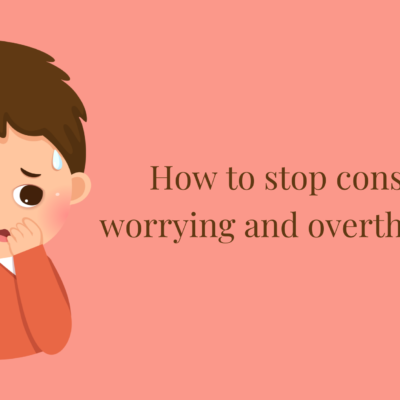How to Stop Constant Worrying and Overthinking: In today’s fast-paced world, worrying and overthinking have become common struggles for many people. Whether it’s stressing about work, relationships, or the future, the mind can easily get trapped in a cycle of endless thoughts. While occasional worrying is natural, constant overthinking can negatively impact mental and physical well-being. This article explores the causes, effects, and solutions to overthinking, providing practical strategies to help individuals break free from this exhausting habit.
Also Read:
- How to Find Peace Within?
- How to Find Happiness from Within?
- How to Cope with Feelings of Loneliness?
Understanding Overthinking
Overthinking is the process of dwelling excessively on a situation, problem, or decision, often leading to anxiety and stress. It can manifest in two main forms:
- Ruminating: Replaying past mistakes, regrets, or failures.
- Worrying about the Future: Imagining worst-case scenarios and fearing uncertainties.
People who overthink often struggle with decision-making, second-guessing themselves even over trivial matters. This habit creates mental exhaustion and prevents them from fully enjoying the present moment.
Causes of Constant Worrying and Overthinking
Several factors contribute to overthinking, including:
- Perfectionism: A desire to make the best possible decision can lead to excessive analysis and hesitation.
- Fear of Failure: People who fear failure tend to overanalyze situations to avoid making mistakes.
- Past Traumas: Unresolved emotional wounds from past experiences can cause individuals to ruminate and overthink.
- Low Self-Esteem: Lack of confidence can lead to excessive self-doubt and fear of judgment.
- Stress and Anxiety Disorders: Chronic stress and anxiety can make overthinking a habitual response to challenges.
Effects of Overthinking on Mental and Physical Health
Constant worrying and overthinking can take a serious toll on both mental and physical health. Some of the common effects include:
Mental Health Impact
- Increased stress and anxiety levels
- Difficulty concentrating
- Decision paralysis
- Depression and mood swings
- Sleep disturbances
Physical Health Impact
- Fatigue and low energy levels
- Headaches and muscle tension
- Digestive issues
- Weakened immune system
Over time, excessive worrying can become a barrier to personal growth and success, preventing individuals from taking necessary risks and embracing new opportunities.
How to Overcome Overthinking
While breaking free from the cycle of overthinking takes effort, it is possible with the right strategies. Here are some effective ways to manage and reduce excessive worrying:
1. Practice Mindfulness
Mindfulness helps individuals focus on the present moment instead of dwelling on the past or worrying about the future. Techniques such as deep breathing, meditation, and body awareness can help calm the mind and reduce overthinking.
2. Challenge Negative Thoughts
Overthinkers often assume the worst. Challenging these thoughts by questioning their validity can help reframe the mind to adopt a more rational perspective. Ask yourself:
- Is this thought based on facts or assumptions?
- What is the worst that can happen, and how likely is it?
- Will this matter a year from now?
3. Limit Information Overload
Excessive research and analysis can fuel overthinking. While gathering information is important, setting a time limit for decision-making can prevent endless deliberation.
4. Engage in Physical Activity
Exercise releases endorphins, which improve mood and reduce stress. Activities like yoga, walking, or dancing can help clear the mind and provide a mental reset.
5. Write Down Your Thoughts
Journaling can help organize thoughts and release pent-up emotions. Writing down worries allows for better clarity and helps individuals see their concerns from a different perspective.
6. Practice Self-Compassion
Being kind to yourself is crucial. Accept that making mistakes is part of life and that no one has all the answers. Self-compassion reduces self-criticism, making it easier to move forward.
7. Set a “Worry Time”
Designate a specific time each day (e.g., 15 minutes) to focus on worries. When an anxious thought arises outside this window, remind yourself to address it during the scheduled time. This technique helps contain excessive worrying.
8. Seek Professional Help
If overthinking becomes overwhelming and affects daily life, seeking therapy or counseling can be beneficial. Cognitive Behavioral Therapy (CBT) is particularly effective in breaking negative thought patterns.
Conclusion
Constant worrying and overthinking can drain energy and prevent individuals from living a fulfilling life. Recognizing the causes and effects of overthinking is the first step toward overcoming it. By practicing mindfulness, challenging negative thoughts, and engaging in positive activities, it is possible to break free from the cycle of excessive worrying. Remember, the goal is not to eliminate thoughts altogether but to develop a healthier relationship with them.








